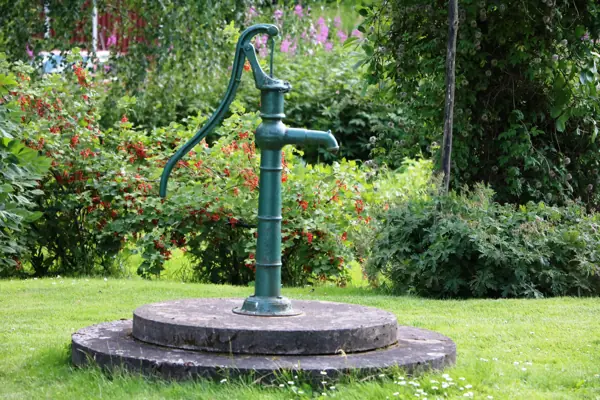Do you have a water well? The first and most important step to ensure your water well is properly protected is installing a quality well cover.
Well covers protect your well from the elements such as rain and snow which can cause rusting or other damage over time. Investing in a high-quality well cover is an important step in preserving your water supply for years to come.
Contaminants That Well Covers Keep Out of Your Water Well
A well-sealed cap serves as the initial defense against nonpoint source pollution, which is the primary cause of groundwater contamination. This closure helps keep the contaminated water out and prevents exposure to different types of pollutants.
Well covers are essential for protecting your water well from contamination, debris, and other damage. They are designed to keep out dirt, insects, rodents, and other animals that can cause problems with the water quality. They also help to prevent accidents by covering the well opening so that people and animals cannot fall into it.
It is possible for bacteria to increase in wells due to the droppings of animals, bugs or even snakes. In some cases, these creatures can fall into the well and die which leads to their decomposition in the water.
Non-point source pollution is a major environmental problem, consisting of run-off from pesticides and herbicides, dirt and dust from the streets, as well as soil erosion. These have caused serious consequences for our environment.
Does Well Cover Keep My Water Safe?
Definitely yes! By repelling unwanted contaminants, surface water can stay untainted and safe to use. These pollutants may not be visible or detectable by taste or smell, so utilizing methods to keep them away from the surface is crucial.
Securing a well cap properly is a critical step in protecting your home’s water supply from potential contamination. It serves as an important barrier to prevent harmful pollutants from entering the water system.
Testing your well water is essential to make sure it’s safe. Even if the well cap looks secure and you don’t detect any off-tastes, it’s still necessary to have an expert inspect the system annually. This will guarantee that your water supply is in good condition.
How Should You Cover Your Water Well?
There are a variety of materials and techniques that can be used to ensure that your well is properly covered, including concrete slabs, heavy-duty tarp, wooden lids, and metal grates.
It is important to consider the type of material that will best suit the environment around your well and provide the highest level of protection. Additionally, you should consider any additional features such as locks or alarms that may be necessary for added security.
Well Seal Vs Well Cap: Know the Differences
Well caps and seals are two very similar products designed to cover & protect the top of a water well, thus enclosing the casing. In basic terms, they serve the same purpose.
Although they appear similar, each design has its own unique set of strengths and weaknesses. Depending on the environment, you will likely find one design more suitable than the other. This is because certain locations and climates may require different specifications.
In today’s session, we will discuss the advantages & disadvantages of the two items and explain when each should be used. We will also analyze when one option is preferable over the other.
Well Seal
In addition to protecting your well, a well seal offers several advantages over a regular well cap. For instance, it can accommodate pump wires, faucets or hoses via holes that are purposefully included in its design. Moreover, you don’t have to worry about your primary water supply as the seal allows it to pass through easily.
Additionally, the well seal serves as a support for the submersible pump which is attached to it. It sits on top and around the inside of the well casing and creates a seal with an integrated O-ring gasket from within.
Well Cap
A well cap is typically a metal lid that sits on top of the well casing. Some brands also offer options made from ABS plastic.
Well caps are typically equipped with a conduit that allows the pump wires to pass through and also have an additional grounding bolt for added safety. Installing a submersible pump will require the presence of a pitless adaptor, not a well-cap, as they are not compatible.
A well cap is strategically placed at the top of a well casing and securely fastened around its exterior perimeter. An O-ring gasket is integrated into the well cap, ensuring a tight seal between the cap and casing.
A comparison of the two types of well covers is a great way to determine which one suits your requirements best. Deciding between the two can be tricky, but understanding their respective uses is key to finding the ideal fit for your needs.
If you are replacing a current well cap or seal, choosing the same product as what was previously used is generally considered to be the most dependable option. If you’re unsure of what was used previously or think something is wrong, there is a better way to decide what would work best for your situation. It involves logically thinking through the options and choosing the one that makes the most sense.
Don’t leave your well vulnerable to contamination! Get your water well cover from Well Doctor LLC today!
Ensuring you have clean, safe drinking water is important for your health. Well Doctor LLC provides water well covers that are specifically designed to protect your well from contaminants and other hazards. Our covers are made with durable materials and come with a variety of features to ensure your family’s safety.
Well Doctor LLC provides you with the highest quality water well covers to keep your family safe and healthy. Our products are designed for maximum protection, and to ensure that no contaminants enter your well. In addition, our covers are easy to install and require minimal maintenance. Plus, we offer well maintenance services at a price you can afford.
Get a water well cover from Well Doctor LLC today and keep your family’s drinking water safe! Call us to learn more!

